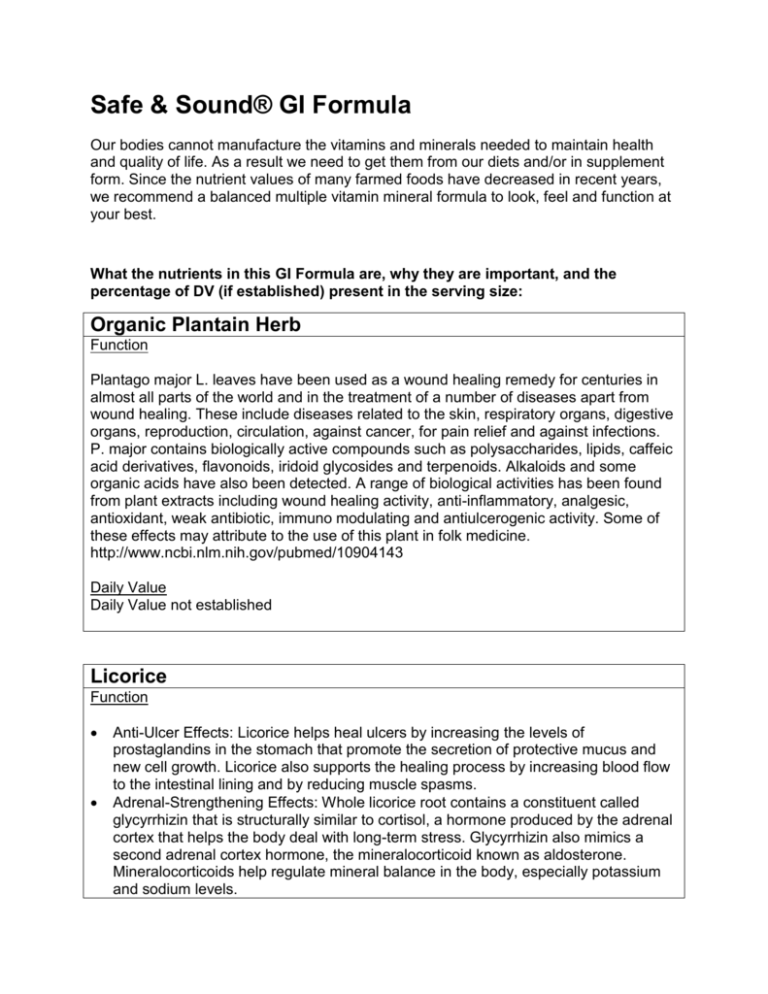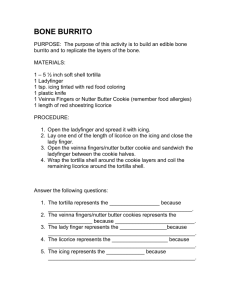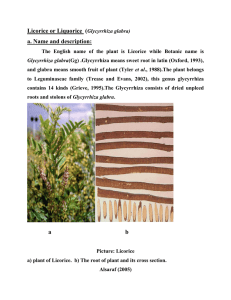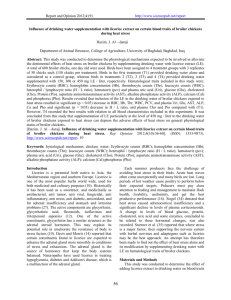Read more details
advertisement

Safe & Sound® GI Formula Our bodies cannot manufacture the vitamins and minerals needed to maintain health and quality of life. As a result we need to get them from our diets and/or in supplement form. Since the nutrient values of many farmed foods have decreased in recent years, we recommend a balanced multiple vitamin mineral formula to look, feel and function at your best. What the nutrients in this GI Formula are, why they are important, and the percentage of DV (if established) present in the serving size: Organic Plantain Herb Function Plantago major L. leaves have been used as a wound healing remedy for centuries in almost all parts of the world and in the treatment of a number of diseases apart from wound healing. These include diseases related to the skin, respiratory organs, digestive organs, reproduction, circulation, against cancer, for pain relief and against infections. P. major contains biologically active compounds such as polysaccharides, lipids, caffeic acid derivatives, flavonoids, iridoid glycosides and terpenoids. Alkaloids and some organic acids have also been detected. A range of biological activities has been found from plant extracts including wound healing activity, anti-inflammatory, analgesic, antioxidant, weak antibiotic, immuno modulating and antiulcerogenic activity. Some of these effects may attribute to the use of this plant in folk medicine. http://www.ncbi.nlm.nih.gov/pubmed/10904143 Daily Value Daily Value not established Licorice Function Anti-Ulcer Effects: Licorice helps heal ulcers by increasing the levels of prostaglandins in the stomach that promote the secretion of protective mucus and new cell growth. Licorice also supports the healing process by increasing blood flow to the intestinal lining and by reducing muscle spasms. Adrenal-Strengthening Effects: Whole licorice root contains a constituent called glycyrrhizin that is structurally similar to cortisol, a hormone produced by the adrenal cortex that helps the body deal with long-term stress. Glycyrrhizin also mimics a second adrenal cortex hormone, the mineralocorticoid known as aldosterone. Mineralocorticoids help regulate mineral balance in the body, especially potassium and sodium levels. Other Hormonal Effects: Licorice contains isoflavones that may help balance levels of estrogen and progesterone in the body. McCaleb, Robert S. The Encyclopedia of Popular Herbs. Roseville, CA: Prima Health, 2000. Print. Licorice helps treat duodenal and stomach ulcers by increasing the healing rate, relieving pain, preventing relapse, and reducing the need for surgery Whole licorice root has a soothing, expectorant, and anti-inflammatory effect on sore throats, coughs, and other respiratory problems Whole licorice helps treat adrenal weakness because of its similarity to cortisol Topical glycyrrhetinic acid may help relieve eczema, psoriasis, contact dermatitis, and allergic dermatitis, because of its anti-inflammatory action A mouthwash containing licorice may be helpful in treating canker sores McCaleb, Robert S. The Encyclopedia of Popular Herbs. Roseville, CA: Prima Health, 2000. Print. Daily Value Daily Value not established Organic Slippery Elm Bark Function Slippery elm (Ulmus fulva) has been used as an herbal remedy in North America for centuries. Native Americans used slippery elm in healing salves for wounds, boils, ulcers, burns, and skin inflammation. It was also taken orally to relieve coughs, sore throats, diarrhea, and stomach problems. Slippery elm contains mucilage, a substance that becomes a slick gel when mixed with water. It coats and soothes the mouth, throat, stomach, and intestines. It also contains antioxidants that help relieve inflammatory bowel conditions. Slippery elm also causes reflux stimulation of nerve endings in the gastrointestinal tract leading to increased mucus secretion. The increased mucus production may protect the gastrointestinal tract against ulcers and excess acidity. There has been little scientific research on slippery elm, but it is often suggested for the following conditions: Sore throat Cough Gastroesophogeal reflux disease (GERD) Crohn's disease, ulcerative colitis, and irritable bowel syndrom (IBS) Diarrhea Wounds, burns, boils, psoriasis, and other skin conditions (external) http://umm.edu/health/medical/altmed/herb/slippery-elm#ixzz3XyZz60oh Daily Value Daily Value not established











